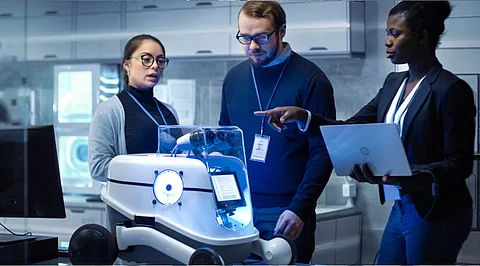
- Insights
- Cryptocurrencies
- Stocks
- White Papers
- Industry
- Geography
- Insights
- Cryptocurrencies
- Stocks
- White Papers
- Industry
- Geography


Intelligent automation is a combination of artificial intelligence (AI) and robotic process automation (RPA), where AI enables insight-driven analytics, decision-making, and personnel management, and RPA automates processes and reduces human participation in them. It is a joint implementation of bots and software intelligence in the production process to assist people in creating new products and services. It brings together various strategies, skills, tools, and techniques that eliminate the need for labour, increase the predictability and reliability of services and reduce costs.
Intelligent automation systems can be implemented in nearly every industrial sector. Advanced techniques and great computing capacity create a new generation of hardware and software robots that perform both cognitive and physical tasks. They not only process vast amounts of information but also analyze it, spot inconsistencies, check for correctness, learn in the process of work, adapt to changes, and make decisions. Though the final decision-making is still the responsibility of a human operator, IA software does much of the work.
IA is an efficient way to boost sales, increase customer engagement and reduce costs, which is why retailers heavily invest in it. Annual expenses for AI are predicted to reach US$7.3 billion by 2022. Indeed, smart automation provides a variety of tools and techniques that impart considerable benefits. Personalized brand experience is more important than ever before. AI enables it by digesting big volumes of data on customer journeys via chatbots, virtual sales assistants, and recommendation engines. On the other hand, smart algorithms can detect signs of fraudulent operations, which allows companies to suppress malicious behavior promptly.
IA has triggered industrial revolutions bringing drastic changes in processes and environments that rely on cyber-physical and cognitive systems. These systems are inspired by recent technological advances, such as AI, ML, IoT, robotics, autonomous vehicles, 3D printing, AR and VR, wearables, additive manufacturing, nanotechnology, biotechnology, energy storage, and quantum computing.
As a result, physical and digital robots that are driven by cutting-edge intelligent automation technologies and tools can perform many operations, replacing or supplementing humans. The factory floor has evolved into dark or lights-out premises where human participation is not required.
With IA, insurance service providers automate data management and rate calculations. IA solutions help insurance companies address problems such as manual entry of bulky data, low scalability of processes, and poor time effectiveness.
Healthcare providers are among major consumers of IA solutions that extensively use both artificial intelligence and RPA. With RPA, medical institutions streamline repetitive processes that are connected with accurate, patterned data retrieval, processing, and decision-making, which creates a whole new age of evidence-based, more efficient care. Decisions are based on retrieved facts and figures, and not on a doctor's experience and knowledge alone. AI's capability to quickly and effectively process large amounts of data helps in the creation of reliable diagnoses that take into account symptoms and secondary conditions.
